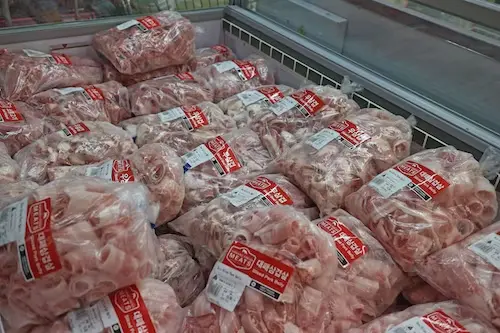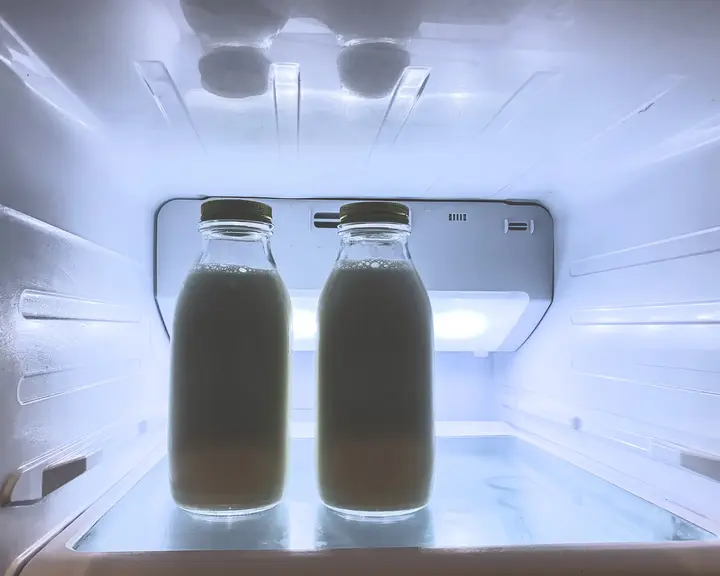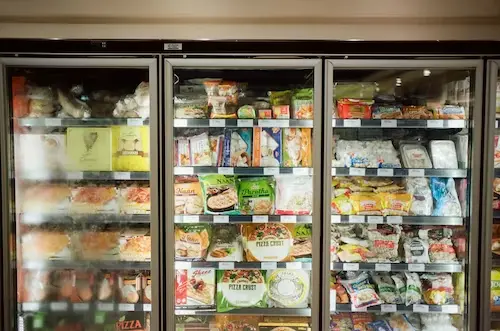How long can food be stored in the refrigerator

The refrigerator is one of the necessary appliances in the kitchen that helps keep food fresh and usable for longer. But have you ever wondered how long foods in the refrigerator are worth it? Do you know the rules to follow to keep food safe? In this article, we'll look at how much food can be stored in the refrigerator and precautions to take to keep it safe.
Show key points
- Maintaining the refrigerator temperature between 2°C and 4°C is crucial to slowing bacterial growth and preserving the freshness of stored food.
- Proper storage of vegetables and fruits—using airtight containers, separating ripe items, and observing recommended durations—extends their shelf life and maintains nutritional value.
- Meat and fish should be kept at low temperatures (below 4°C for meat and 0–2°C for fish), stored in airtight containers, and consumed within a set period to prevent spoilage and contamination.
- ADVERTISEMENT
- Dairy and milk products must be consumed by their expiration dates and discarded if they exhibit changes in odor, texture, or color, indicating spoilage.
- Opened canned foods should be transferred to airtight containers and refrigerated for short-term storage, while unopened canned goods last longer but still require proper inspection before use.
- Cross-contamination can be avoided by separating raw and cooked foods within the refrigerator, ensuring that cleanliness and food safety are upheld.
- By adhering to proper storage guidelines and regularly checking food condition, you can improve food safety, reduce waste, and protect your family's health.
1. The optimum temperature of the refrigerator and its effect on the shelf life of food.

The optimum temperature in the refrigerator is one of the main factors affecting the validity and safety of food. You may be wondering the important question: what temperature should the refrigerator stay at to keep food fresh and edible?
Recommend
According to the Centers for Disease Control and Health Prevention, refrigerator temperature should be set to a range between 2°C and 4°C (36°F to 40°F). Low temperature helps slow down the growth of bacteria and mold and extend the life of food in the refrigerator.
Note that you should avoid setting the refrigerator temperature to a higher temperature, such as 5°C (41°F) or higher. In this case, the rise in temperature may lead to increased bacterial activity and accelerated food degradation.
Moreover, it is important to maintain a stable temperature in the refrigerator and avoid large temperature fluctuations. Sharp fluctuations in temperature can cause the rapid growth of bacteria and cause food spoilage quickly.
In addition to adjusting the temperature of the refrigerator, foods must also be properly distributed inside it. Pure and uncooked foods should be placed on the bottom shelf of the refrigerator, away from cooked foods prepared for consumption. This helps prevent cross-contamination and maintain the quality of food.
In short, adjusting the temperature of the refrigerator to the optimum range and maintaining its stability contributes to maintaining the shelf life of food and avoiding food poisoning.
2. How well vegetables and fruits are stored in the refrigerator.

Vegetables and fruits are the most important nutritional components that must be included in our daily diet. They are a rich source of vitamins and minerals that are essential for our health. But what about the correct way to store these delicate foods in the refrigerator? Do you know how long it can stay fresh and healthy before it goes bad? In this section, we will give you some tips and directions to store vegetables and fruits in the refrigerator properly to maintain their quality and shelf life for longer.
First, let's talk about vegetables. Vegetables must be fresh and clean before being placed in the refrigerator. Separate the fallen leaves and keep only the usable parts. Place the vegetables in food storage bags or airtight containers to keep them moist and prevent them from drying out. You may need to wash and cut some vegetables before storage, and in order to maintain their quality, it is preferable to immerse them in cold water for a few minutes before drying and storing in the refrigerator.
As for fruits, they require some extra care to maintain their taste and texture. Before storing fruits in the refrigerator, make sure they are fully ripe. You may need to separate some fruits, such as bananas and apples, from each other to prevent them from breaking off. Place the fruits in a tray or flat saucer lined with tissue paper to absorb excess moisture. Some fruits served may need to be stored in airtight food storage bags to keep them fresh.
Remember that the life of vegetables and fruits in the refrigerator depends on the type of plant and its condition before storage. However, there are some general guidelines that can help determine the shelf life of these foods:
Leafy greens such as spinach and cabbage can be kept for 3 to 5 days.
Root vegetables such as carrots and potatoes can be kept for a period of two weeks to one month.
Ripe fruits such as strawberries and raspberries can be kept for 3 to 7 days.
Larger fruits such as watermelon can be kept for up to two weeks.
Avocados, banana and oranges can be kept for two to three weeks.
Remember that these periods are only approximates, and the sense of sight and smell should be used to assess the condition of vegetables and fruits before consuming them.
Make the most of fresh vegetables and fruits by storing them properly in the refrigerator. Follow the above guidelines and directions and spend just a few minutes to maintain the quality of food and maintain your overall health.
3. Meat and fish: rules and recommendations.

When it comes to storing meat and fish in the refrigerator, there are specific rules and recommendations that must be adhered to to maintain their safety and quality. Meat and fish are quickly perishable foods if not properly processed and stored properly.
First and foremost, meat and fish should be purchased from reliable and reputable sources. Meat and fish purchased from trusted sellers may be of more quality and purity compared to those offered in unreliable places.
When storing meat in the refrigerator, the refrigerator temperature should be appropriate and set at 4°C or below. This helps reduce bacterial growth and meat degradation. There are also some other tips to follow when storing meat:
Raw meat for immediate consumption should be stored in the best condition.
Cooked meat and cooked meat products should be stored in airtight containers and placed in the refrigerator after they have cooled.
Meat from which the skin or fat has been removed should not be frozen, as it loses some of its flavor and quality.
Meat should be frozen in cases where it will not be used in a short period, in order to maintain its shelf life for a longer period.
As for storing fish in the refrigerator, there are some recommendations that must be followed to maintain the quality of fish:
The temperature of the refrigerator should be from 0 to 2 ° C for storing fish.
It is preferable to store fish in dry conditions, so that plastic bags can be used with air removal to wrap them before placing them in the refrigerator.
It is recommended to store fresh fish in the refrigerator for only two to three days.
Frozen fish should not be frozen again after thawing, as this leads to a deterioration in their quality.
In short, storing meat and fish in the refrigerator requires following important rules and recommendations to maintain their quality and safety. It is necessary to buy them from reliable sources, store them at a suitable temperature, and use appropriate storage means. You must adhere to these guidelines to enjoy healthy and delicious food and avoid potential health problems.
4. Milk and dairy: when should they be discarded?

Over time, milk and Albanian products can spoil and lose their nutritional qualities and the fresh taste we love. Therefore, it is important to be careful and know when to discard these products if we do not want to eat food that may be harmful to our health. In this part of the article, we will review the most important guidelines and standards to consider when considering discarding milk and milk left in the refrigerator.
Above all, we should know that the expiration date is very important when dealing with dairy products. We must make sure to look at the expiration date before purchasing these products and avoid buying any product that has expired or will expire soon.
When storing milk and milk in the refrigerator, we must be careful and know that these products are not incorruptible. Usually, packaged milk should usually be consumed within a week of purchase, while packaged dairy products can take several weeks or months. However, there are some signs that can indicate that milk or Albanian products have spoiled and should be discarded.
One of the primary signs is the appearance of an abnormal or unpleasant odor. If you smell an unusual smell or strange flavor in milk or dairy, it's likely gone bad and needs to be discarded.
There is also another thing to note, which is the change in the color or texture of Albanian products. If you notice any change in the color or texture of milk or Albanian products, such as strange lumps or a change in color to brown or pink, they should be discarded immediately as these may be signs of deterioration in quality and product decay.
Always keep track of the expiration dates printed on milk and dairy containers and store them at an optimal temperature in the refrigerator. If there are any doubts about the quality or safety of the product, it is best to be on the safe side and dispose of it. Remember that your safety and health are the top priority.
5. Canned food: how long can be kept in the refrigerator.

In our modern world, canned food has become an indispensable part of the kitchen preparation and cooking processes. They provide us with convenience and ease in getting fast and convenient meals at any time. But have you ever wondered about the shelf life of canned foods in the refrigerator? Do you know how long it can be kept before it loses its taste and quality? In this section, we'll uncover how long canned foods can last in the refrigerator before they spoil and what actions need to be taken to ensure their safety.
When looking at the canned foods in your refrigerator, you should remember that the date printed on the box is not the expiration date, but indicates a better period of consumption. If stored in suitable conditions, they can last longer than the specified date.
However, there are some canned foods that may be more sustainable than others. For example, canned fruits tend to stay good for a long time if stored in a refrigerator that maintains a low and stable temperature. However, you should check the condition of the fruit before eating it, if you notice any change in color, smell or taste, it is advised not to consume it.
For canned vegetables, they may be affected faster by oxygen and moisture. If you open a box of canned vegetables and don't use them completely, it's best to move them to an airtight container and store them in the refrigerator for a short time. It is essential to avoid storing open canned vegetables for a long time, as this can lead to spoilage and deterioration of their quality.
When looking at canned meat and fish, you should be very careful. Although fresh meat and fish are often packaged in canned packaging with the aim of extending their shelf life, they can deteriorate quickly if not properly maintained. Dates on packages should be checked and the manufacturer's recommendations on how long they can be kept in the refrigerator should be observed.
Milk and canned milk are very popular in kitchens. Although they may seem durable and storable for a long time, they deteriorate quickly if stored inappropriately. You should keep canned milk and milk in the refrigerator and consume it within a short time after opening the can.

When you take care of storing food in the refrigerator properly, it can last longer and offer your family and loved ones delicious and healthy meals. If you want to make the most of the food you buy and save money spending, don't forget to follow the correct guidelines and rules for storing food in the refrigerator. These actions may seem small but they play a big role in keeping food safe and your overall health.








